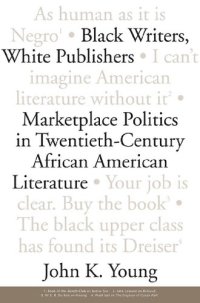
Ebook: Black Writers, White Publishers: Marketplace Politics in Twentieth- Century African American Literature
Author: John K. Young
- Year: 2006
- Publisher: University Press of Mississippi
- Language: English
- pdf
Jean Toomer's Cane was advertised as "a book about Negroes by a Negro," despite his request not to promote the book along such racial lines. Nella Larsen switched the title of her second novel from Nig to Passing, because an editor felt the original title "might be too inflammatory." In order to publish his first novel as a Book-of-the-Month Club main selection Richard Wright deleted a scene in Native Son depicting Bigger Thomas masturbating. Toni Morrison changed the last word of Beloved at her editor's request and switched the title of Paradise from War to allay her publisher's marketing concerns.
Although many editors place demands on their authors, these examples invite special scholarly attention given the power imbalance between white editors and publishers and African American authors. Black Writers, White Publishers: Marketplace Politics in Twentieth-Century African American Literature examines the complex negotiations behind the production of African American literature.
In chapters on Larsen's Passing, Ishmael Reed's Mumbo Jumbo, Gwendolyn Brooks's Children Coming Home, Morrison's "Oprah's Book Club" selections, and Ralph Ellison's Juneteenth, John K. Young presents the first book-length application of editorial theory to African American literature. Focusing on the manuscripts, drafts, book covers, colophons, and advertisements that trace book production, Young expands upon the concept of socialized authorship and demonstrates how the study of publishing history and practice and African American literary criticism enrich each other.
Jean Toomer's Cane was advertised as "a book about Negroes by a Negro," despite his request not to promote the book along such racial lines. Nella Larsen switched the title of her second novel from Nig to Passing, because an editor felt the original title "might be too inflammatory." In order to publish his first novel as a Book-of-the-Month Club main selection Richard Wright deleted a scene in Native Son depicting Bigger Thomas masturbating. Toni Morrison changed the last word of Beloved at her editor's request and switched the title of Paradise from War to allay her publisher's marketing concerns.
Although many editors place demands on their authors, these examples invite special scholarly attention given the power imbalance between white editors and publishers and African American authors. Black Writers, White Publishers: Marketplace Politics in Twentieth-Century African American Literature examines the complex negotiations behind the production of African American literature.
In chapters on Larsen's Passing, Ishmael Reed's Mumbo Jumbo, Gwendolyn Brooks's Children Coming Home, Morrison's "Oprah's Book Club" selections, and Ralph Ellison's Juneteenth, John K. Young presents the first book-length application of editorial theory to African American literature. Focusing on the manuscripts, drafts, book covers, colophons, and advertisements that trace book production, Young expands upon the concept of socialized authorship and demonstrates how the study of publishing history and practice and African American literary criticism enrich each other.